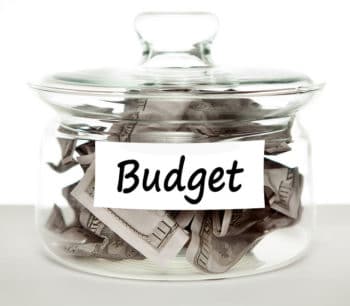
So, here are a few tips to make staying on budget a little easier.
1. Start With Realistic Goals
You’ll never be able to stick with a budget if it sets impossible goals. The first step is to be brutally honest about what income is going to come in and what you’re going to spend. Start with the expenses that you can’t change, like rent and car payments. Then, take the rest of your income and figure out where you’ll need to spend it. Use hard data – take a look at your grocery receipts to figure out how much you’re actually spending every week, for example.
Experts often recommend saving at least 10% of your income – and that’s a great goal! If you have enough, in fact, you should save 90% of your income! Unfortunately, that’s just not realistic for many of us. Many of us find that we don’t have enough to cover all of our expenses, let alone put money away. When you fall short, you have to be just as realistic about what you plan to cut out as you are about the rest of your budget. Can you really cut your grocery bill in half? Probably not. But you probably can cut the amount you spend eating out.
2. Don’t Give Yourself the Chance to Cheat
A realistic budget is better than an unrealistic one, but that it’s still not easy to follow. One way to help yourself stay on track is to simply take the money out of your own hands. The envelope method is one good way to do it. Every month, take your income in cash and split it up into different envelopes based on your budget. Your rent can go in one, your car payment in another, and your gas money in another. That helps you physically see how much cash you have to spend, making you less likely to overspend. It also makes you really think hard about taking from one envelope to cover a shortage in another.
There are also other methods. You can set up automatic withdrawals for your bills, for example, so that money goes straight where it’s supposed to and you don’t have a chance to spend it. You can also set up automatic withdrawals to a savings account, which makes it easier to put a little money away.
3. Take Advantage of Technology
Budgeting used to be a pen-and-paper thing, but there are a ton of great programs out there that can make it easier. There are apps to create budgets for you, track your spending, and remind you when you’re getting close to going over. Some of them can manage your bill payments and other tasks, too. Some can help you save for a rainy day. Some gather coupons so you don’t have to clip them out of the newspaper. Check out our guide to some great personal finance apps!
4. Give Yourself Rewards
It would be great to make enough money to not have to create a strict budget, but most of us don’t have that luxury. But following that strict budget means you’re constantly paying attention to everything you spend and may mean that you’re giving up things you love. And if you do that all the time without a break, you may end up splurging and going over.
Instead, try to find a way to put a few bucks away every month. It doesn’t have to be a lot – even just $5 or $10 a month. When you have enough, you can use it for something special – a fancy dinner or a night on the town or a day at the spa. Having that little treat to work toward can make sticking to the rest of your budget a whole lot easier. It gives you something to look forward to as a reward for all your hard work and discipline!
5. Don’t Be Too Hard on Yourself
No matter how dedicated you are to your budget, sometimes you just won’t be able to stick to it. You may lose your job or face unexpected expenses or you may just have spent a little more than you planned. It happens. Try not to be too hard on yourself about it; budgeting takes practice. And your budget will change over time as your needs change, so going over may just mean that you need to tweak it a little.
Image Credit and License
